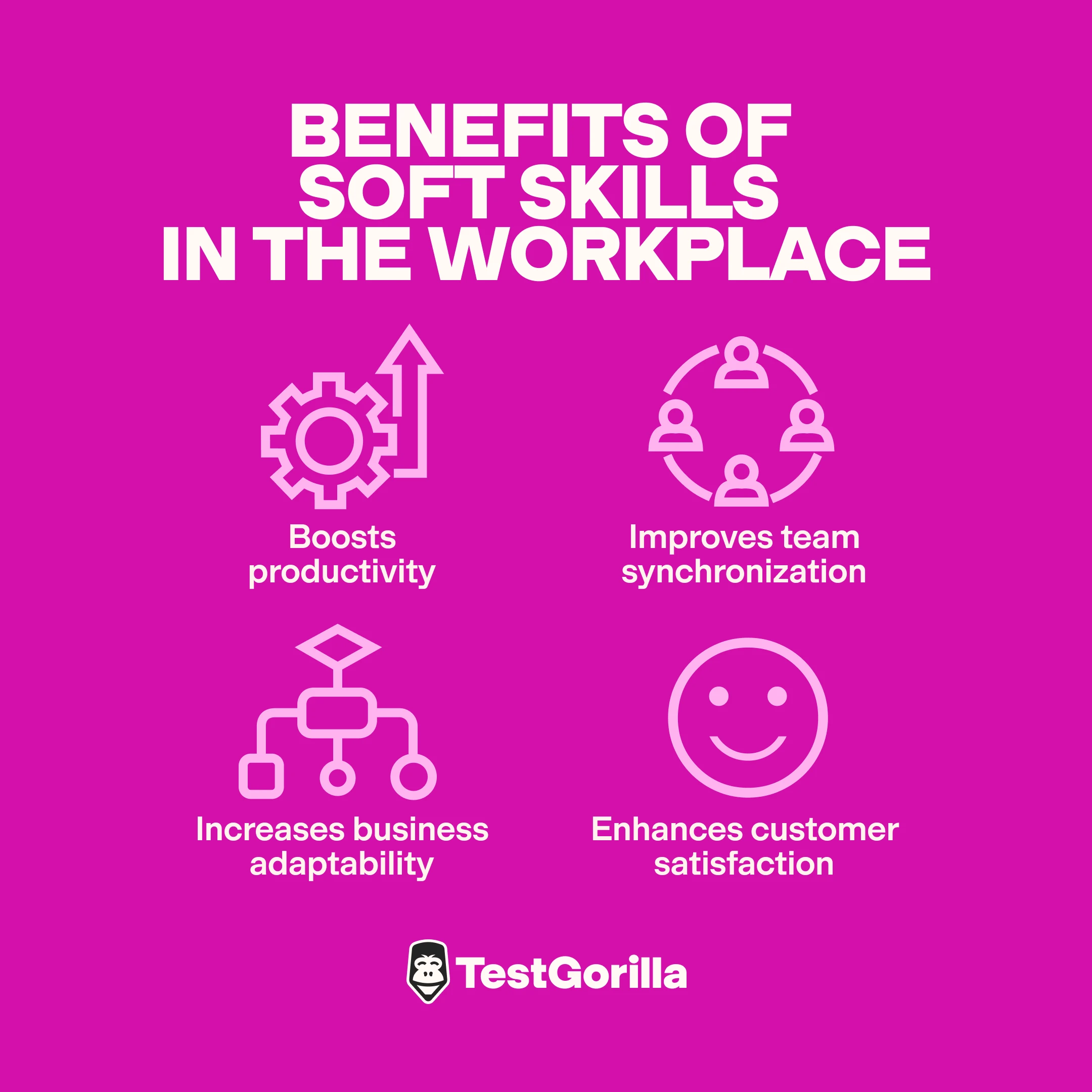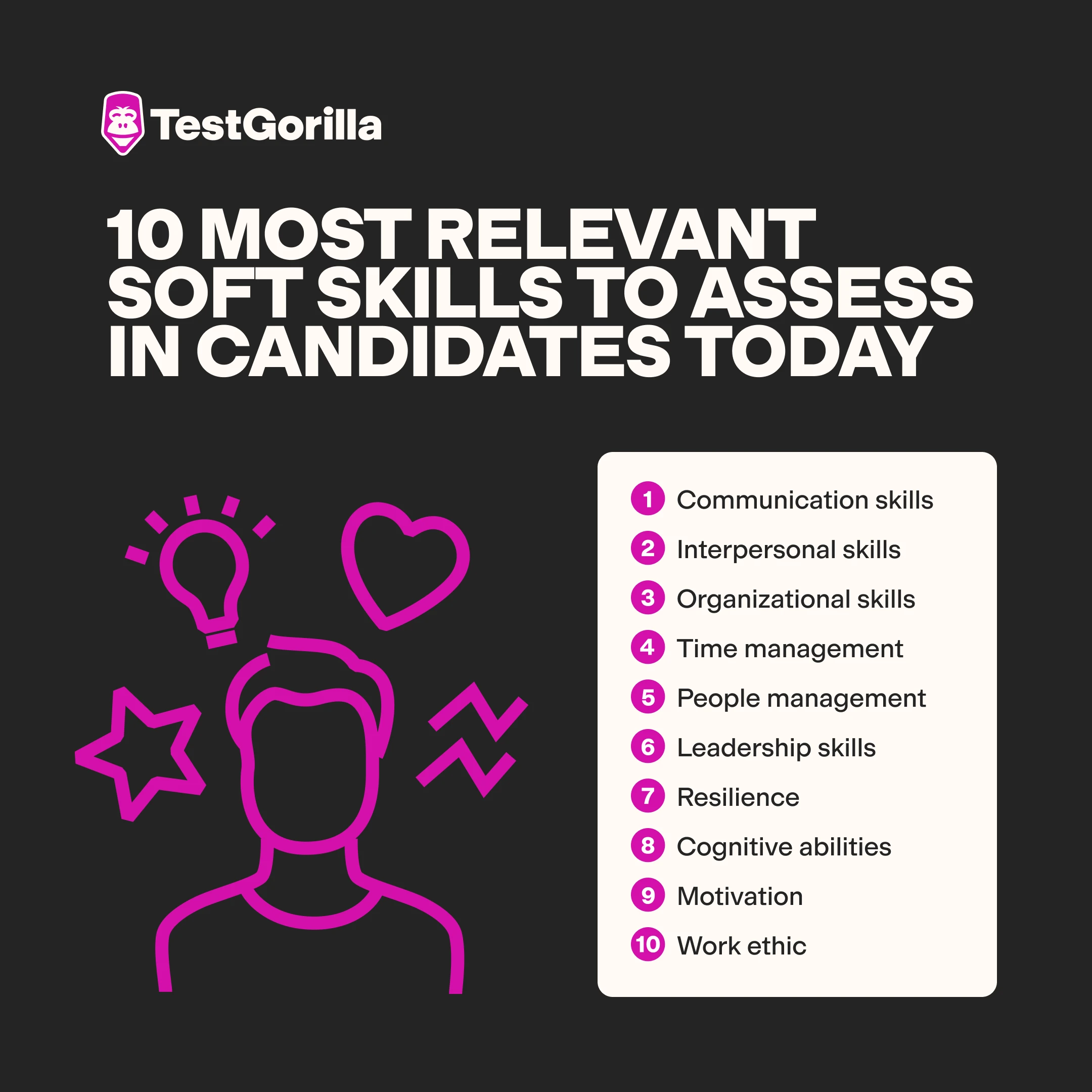According to LinkedIn’s Global Talent Report, almost 90% of employers noted that their bad hires lacked soft skills.
Why were these candidates hired in the first place? Many companies struggle to clearly define, prioritize, and measure soft skills during the hiring process – putting all their energy into technical skills.
The result? Mis-hires who not only won't last but could also hamper team dynamics, customer relationships, and more before they exit.
Want to avoid these problems? We’re here to help.
In this article, we break down what soft skills in the workplace are, which ones to look for, and how to accurately assess them so you can make strong and successful candidate selections.
What are soft skills in the workplace?
Soft skills include a wide range of behavioral traits, social abilities, and cognitive skills that help employees successfully steer through their work environment, build strong relationships, and meet their objectives.
Unlike hard or technical skills, which relate to job-specific tasks like budgeting or programming, soft skills are the essential human skills employees use when communicating, ideating, problem-solving, and working as a team.
For example, while a software developer may have excellent coding skills, it’s how they collaborate, innovate, and manage their time that influences their overall success at work.
Wondering how to assess soft skills in software developers? Check out our guide to soft skills interview questions for software developers.
Why are soft skills in the workplace so important?
According to The State of Skills-Based Hiring 2024 report, nearly nine in 10 employers believe soft skills are more important than ever. Let's look at why soft skills matter in today's work landscape.
Boosts productivity
While hard skills enable employees to get the job done, soft skills improve the process. For instance, an employee with great organizational and time management skills can complete more tasks in a given period, increasing overall productivity. Meanwhile, those with excellent attention to detail can reduce errors and their associated costs.
Improves team synchronization
Good soft skills improve internal communication and relationships, ensure everyone is on the same page, and boost team synchronization. For instance, strong leadership skills during a project kick-off meeting result in all members understanding their roles and working toward common goals.
Increases business adaptability
Unlike hard skills, soft skills are transferable across business areas and roles, meaning businesses can swiftly reallocate resources to keep up with and even beat the competition. For example, employees who are motivated and willing to learn can be transferred to areas of high demand and upskilled to fill the gaps.
Enhances customer satisfaction
Communication skills, such as active listening and empathy, play an important role in customer service. Employees who understand customers’ needs and solve their problems can help you retain key clients and encourage positive reviews for your business.
The best insights on HR and recruitment, delivered to your inbox.
Biweekly updates. No spam. Unsubscribe any time.
10 soft skills every employer should look for
Here are 10 of the most relevant soft skills to look for in candidates today.
1. Communication skills
These skills relate to sharing, receiving, and interpreting spoken or written comms. Moreover, excellent communicators will also be great at analyzing non-verbal cues like body language and tone of voice.
Effective communication can help employees break down complex ideas, keep everyone aligned, and prevent misunderstandings. Look for candidates who are articulate and capable listeners, and ask clarifying questions in their applications and your interactions with them.
2. Interpersonal skills
Employees with people skills interact positively and work effectively with others. They’re key to building stronger relationships in a company, maintaining harmony, and boosting team cooperation. Without this, you can expect more conflict, a lack of collaboration, and a dip in team morale.
Candidates skilled in this area will shine in their interactions with others during role-play exercises and interviews. Look for a genuine desire to accept diverse perspectives, address conflict head-on, and for those who contributed to a positive work environment in previous roles.
3. Organizational skills
Good organizational skills are about managing physical and mental resources effectively. This includes managing files and inventory, keeping a tidy workplace, planning projects, and allocating resources to maximize efficiency and reduce mistakes.
Look for candidates who can give real-life examples of how they’ve organized their work and themselves, improved processes, and saved time for their team and company.
4. Time management
Time management refers to the ability to schedule and execute work efficiently. It’s critical for completing tasks on time and reducing workplace stress and overwhelm.
Those skilled in time management will have a clear-cut and proactive approach to prioritizing daily tasks and might even discuss the use of digital tools and planners that help employees keep track of their deadlines and appointments.
5. People management
These people skills are about how managers guide and motivate their team members to achieve individual and collective goals. Managers are also responsible for managing performance, providing feedback, resolving conflict, and looking after the overall well-being of their employees.
Poor people management skills can lead to disengaged workers and turnover issues. To gauge their people management abilities, ask candidates about previous management roles, including how many people they managed, examples of conflict resolution, and how they navigated tricky employee circumstances.
6. Leadership skills
Leadership is about inspiring and influencing others and ensuring a department or company meets its business objectives. Good leaders are great delegators and motivators and can drive their teams through change. However, the wrong leader can wreak havoc, push employees out the door, and even damage your reputation with customers.
Find candidates with great emotional intelligence. Look for clear examples of how they've led their teams through significant changes and implemented innovative projects. Finally, ensure their leadership style aligns with your company’s culture and values.
7. Resilience
Resilience is one of the most underrated but valuable skills in today’s job market. It’s the capacity to stay composed during unexpected or high-pressure situations, adapt to changes, and recover quickly from difficulties.
In a fast-evolving and challenging business landscape, resilient employees can be the difference between your company failing or pushing through to success. Top candidates will describe how they’ve previously managed through setbacks or adapted to major changes in their personal or professional lives.
8. Cognitive abilities
Cognitive abilities are mental skills such as critical thinking, problem-solving, creativity, attention to detail, and analytical thinking. These skills help employees process information, spot problems, devise creative solutions, and make informed decisions.
According to the World Economic Forum’s latest Future of Jobs report, these transferable skills will be among the most sought-after in the next five years as the world continues to change.
Choose candidates with strong cognitive skills. They'll display a clear and logical thought process, have an aptitude for critical thinking and solving problems, and make sensible, data-backed decisions in their tests, problem-solving exercises, or cognitive ability interviews.
9. Motivation
This is what drives individuals to pursue and achieve their personal and professional goals. High motivation is key to keeping employees engaged in their work and enthusiastic about company objectives, even over long periods.
You’ll recognize driven candidates when they provide examples of past achievements in their personal lives or careers and the steps they took to get there. Additionally, look for those who speak passionately about the industry, your product, and their careers, showing a clear desire to work and succeed in the field.
10. Work ethic
Work ethic is a set of values that pushes people to work hard and do well. Employees with a strong work ethic are dedicated, reliable, and committed to producing high-quality work. Not to be confused with work ethos, which concerns employees’ ethical standards and principles at work.
Ensure you look for punctual and conscientious candidates who take pride in their work and show examples of dedication to completing their tasks. Moreover, spot candidates whose interaction with others, professionalism, and views on integrity and fairness align with your company’s values.
Hire the most well-rounded candidates with the right tests
Understanding which soft skills to look for is just the first step to hiring effectively. You must also find a way to measure these skills – a challenge many employers struggle with.
And, since candidates tend to focus more on technical skills when writing resumes, cover letters, and application forms, employers are often stuck with an on-the-spot assessment during the interview.
The answer? Pre-employment tests. Putting candidates through soft skills tests gives you an objective way to see these human skills in action. We found that over half of employers felt skills-based assessments helped verify candidates' soft skills and cognitive abilities.
TestGorilla’s library of 400+ science-backed tests enables you to evaluate candidates’ communication, problem-solving, attention to detail, and people management and leadership skills. For a holistic assessment, you can pair these with personality, cognitive ability, and technical skills tests.
Furthermore, combining these tests with the right soft skills interview questions can give you a complete understanding of a candidate's suitability for a job. This way, you can make stronger selection decisions and provide new joiners with relevant soft skills training and coaching to set them up for success.
To find candidates with the skills you need, create a free TestGorilla account and explore all our tests today.
Related posts
You've scrolled this far
Why not try TestGorilla for free, and see what happens when you put skills first.
















